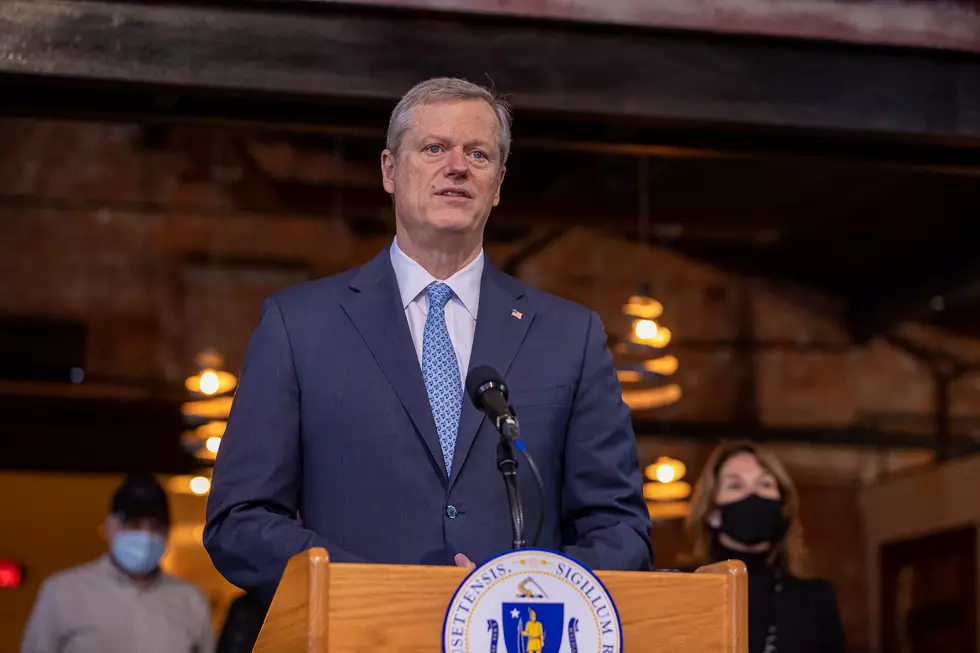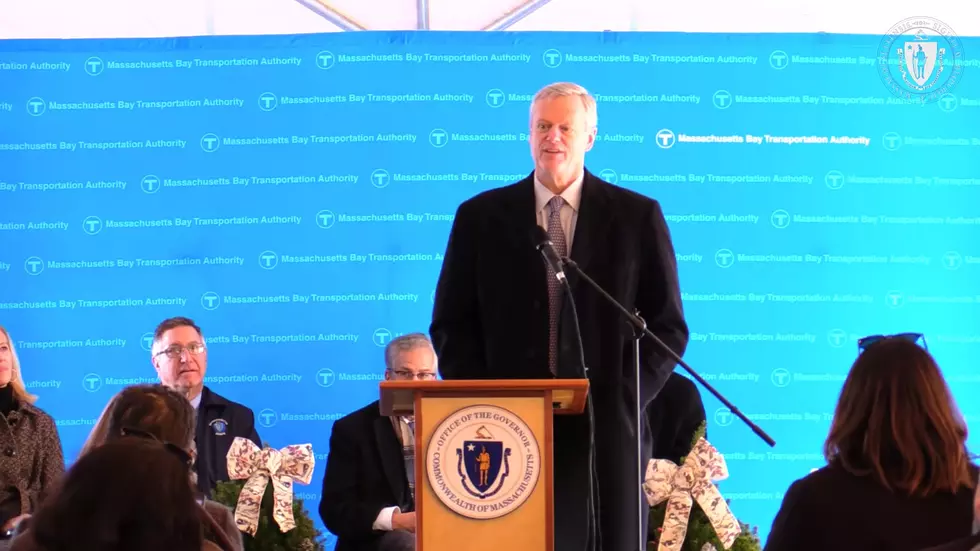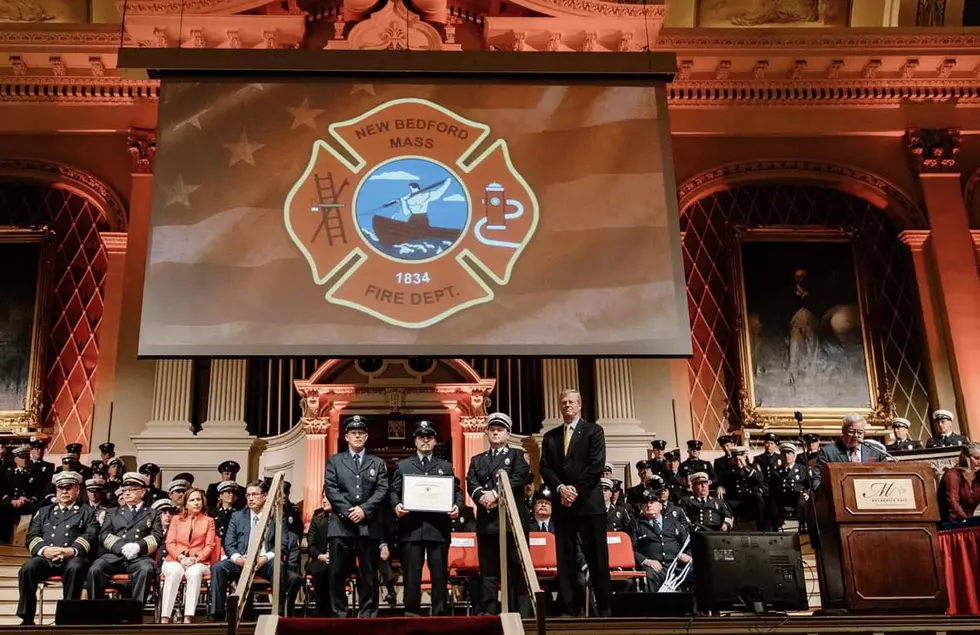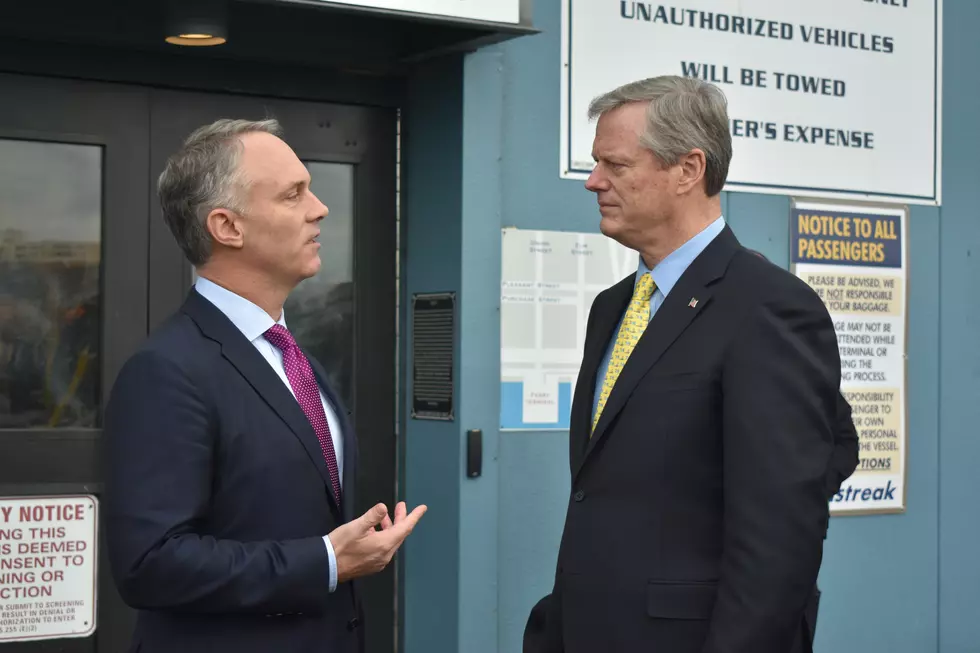
Baker Calls Guard Up, Asks For Masks On
BOSTON — Amid the twin crises of an Omicron-fueled COVID-19 surge and a health care staffing shortage, Gov. Charlie Baker will activate hundreds of Massachusetts National Guard personnel and require hospitals to postpone or cancel non-essential elective procedures.
The moves, which Baker and Health and Human Services Secretary Marylou Sudders announced Tuesday alongside an updated mask advisory, aim to relieve pressure on the state's overstretched health care system as the variant and holiday gatherings drive spread of the virus.
"There's no question the next few weeks will be enormously difficult for our health care community," Baker said at a State House press conference.
"There are staff shortages, sicker patients and fewer step-down beds available, again, because of those staff shortages. The steps we're announcing today are designed to support them so that they can continue to care for patients."

Baker's plan quickly drew criticism from some elected Democrats and public health experts, who warned that the rapid spread of the omicron variant demands more dramatic action including a full mask mandate for indoor public spaces.
The governor will activate up to 500 National Guard personnel to help staff health care facilities in need.
Up to 300 members will begin training this week to support 55 acute care hospitals and 12 ambulance service providers.
They will be deployed starting Monday, Dec. 27 to roles including non-emergency transport between facilities, observation of patients at risk of harming themselves, security, food service, and transporting patients inside hospitals.
Another 80 to 85 personnel covered by the latest order are already in action assisting with school testing, Sudders said, and roughly 50 more will "manage logistics."
The remaining 60 to 70 Guard members in the latest activation will be available if necessary.
Also starting Dec. 27, hospitals must cancel or reschedule any "non-essential, non-urgent scheduled procedure" likely to result in inpatient admission, excluding individual specialty hospitals and facilities that maintain at least 15 percent availability in their medical-surgical and intensive care unit beds.
Hospitals Nearing Capacity
Massachusetts hospitals are operating at more than 90 percent of inpatient capacity despite previous steps to reduce non-essential and non-urgent scheduled procedures, and the state has 500 fewer acute care beds available, when compared to January, because of "unprecedented staffing shortages," Bureau of Health Care Safety and Quality Director Elizabeth Kelley wrote in a memo to hospital CEOs.
Sudders said staffing shortages and site availability pose a challenge for field hospitals around the country, implying the state may have the resources available to pursue that option again.
Baker said the "vast majority" of hospitalizations for COVID-19 in Massachusetts involve patients who have not received vaccines, which he said offer "tremendous protection from illness."
The Department of Public Health on Tuesday issued an updated mask advisory that recommends, but does not require, all residents cover their faces in indoor public spaces even if they are fully vaccinated against COVID-19.
The mask advisory takes effect immediately.
Massachusetts had varying forms of a mask mandate in place for much of the first year during the pandemic.
DPH replaced it with an advisory in May, about a month before Baker ended the COVID-19 state of emergency.
Asked Tuesday if he would need to declare another state of emergency to have the power to order another mandate, Baker replied that he has "no interest in putting a mandate on this issue given all the tools that are available on a statewide basis."
"If locals wish to pursue alternative options, they can do so," Baker said. "We issued a mask mandate last fall because we had no other options available to us. At this point in time, we have vaccines, we have rapid tests, we have our testing sites, and people know a lot more about what works and what doesn't with respect to combatting the virus."
"If people wish to add an extra layer of protection by wearing a mask in indoor settings, we would urge them to do so, especially when we have cases rising across the commonwealth," he added.
Blowback Over Baker's Approach
The governor's plan, and specifically his decision to stop short of a full mask mandate, landed with a thud among some public health experts who have been pressing for the administration to take more dramatic action.
Julia Raifman, a Boston University School of Public Health professor and researcher, said an advisory alone is "not sufficient to achieve everyone in an indoor space wearing masks all at once."
Data indicate that full mandates increase mask-wearing rates "far above the levels that we see in Massachusetts," she said.
"That is a policy that begins reducing spread today," Raifman told reporters. "It's one of the most important things we can do most quickly."
She also suggested the Baker administration consider reviving capacity limits for some indoor venues where patrons tend to gather in close proximity without masks, such as bars and restaurants, because of the "very dangerous situation" the state is in.
In the latest data from DPH, Massachusetts recorded an average of 4,244 new COVID-19 cases per day over the past week, more than three times as high as the 1,155 seven-day confirmed case average reported on Nov. 1.
The number of patients hospitalized for COVID-19 has been rising, too, from 522 on Nov. 1 to 1,513 in DPH's Monday report.
The death rate has also been rising, nearly doubling from a seven-day average of 12 on Nov. 1 to 22 on Dec. 17.
Even after that increase, the rate remains well below its level from this time last year — the seven-day average was 53 on Dec. 21, 2020 — thanks in large part to widespread vaccination.
Sen. Becca Rausch, who hosted Raifman and other medical experts and community leaders for a virtual press conference, touted a "COVID-19 Action Plan" she unveiled last week as a better option to slow the spread of the virus and avoid excessive strain on Bay State Hospitals.
Her plan calls for an indoor mask mandate based on local transmission risks as well as expanded mobile vaccination clinics in hard-hit communities, greater housing protections, new workplace safety standards, a stricter public school masking requirement, and several other steps.
The Needham Democrat called Baker's proposal to deploy National Guard personnel to hospitals "important, but entirely reactionary to COVID transmission."
"It is as if the governor has completely forgotten what flattening the curve means, even though our hospitals are at capacity," Rausch said.
She added later, "We need action and leadership now, and for the entire state, not just the cities with mayors willing to step up and lead the charge against COVID without meaningful preventive measures from the state."
Julia Koehler, a physician in the Division of Infectious Diseases at Boston Children's Hospital and a pediatrics professor at Harvard Medical School, said the state's messaging should make clearer the importance of booster shots in combatting the omicron variant.
She cited a blog post from National Institutes of Health Director Francis Collins reporting that a third dose of the Pfizer vaccine offered 25 times more protection against omicron than just the standard two-shot series.
"I would end with one question to the governor: if there is something you can do to save one life, if there's something that you can do to save one child from losing their father, losing their mother or losing their grandmother, why would you not do it?" Koehler said. "And if you can protect 1,000 lives, why would you not do it?"
Democrats wield veto-proof majorities in both branches, but legislative leaders so far have shown virtually no interest in imposing stricter COVID-19 requirements via legislation.
The legislature also has two weeks remaining on its winter recess, a period marked by light, informal sessions.
Senate President Karen Spilka said Tuesday that she wants Baker to strengthen his mask advisory into an indoor mask mandate, require proof of vaccination in most indoor social venues, and convert pooled testing in Massachusetts schools to an opt-out system rather than an opt-in.
Spilka did not say whether the legislature would move to require mask-wearing or other additional mitigation measures if Baker does not act on her request.
"We must act aggressively to mitigate the impact and spread of the new COVID-19 Omicron variant across Massachusetts and prioritize protecting our most vulnerable residents, workers, and communities disparately impacted by the pandemic," Spilka said in a statement.
"To do this, I believe it's necessary to go beyond advisories and recommendations and apply a uniform, consistent approach to stopping the spread and saving lives. While I thank the Governor for his actions to date, today, I am calling on the Administration to reinstitute a statewide indoor public mask mandate, increase efforts to achieve vaccine equity and require proof of vaccination for most public indoor social venues."
"Additionally, when it comes to school safety, our COVID-19 pool testing practices should be provided on an opt-out, rather than opt-in, basis to better protect our students, teachers and staff," Spilka added.
"Many communities, businesses and school districts have already instituted these measures to help save lives and they should be applauded. However, time is of the essence and a patchwork strategy will not lead to a healthier, faster recovery for Massachusetts."
Congresswoman Ayanna Pressley is also among those who want Baker to take additional action, writing in a letter to the governor on Tuesday that is "critical that any comprehensive statewide plan include the reinstatement of a statewide universal indoor mask policy."
No Longer "Hunkering Down"
A year ago, Baker implored Bay Staters to cancel any planned travel or gatherings and celebrate the holidays only with members of their own household, warning that any festivities beyond that had "real potential" to spread the highly infectious virus.
But as he announced new steps on Tuesday to reduce strain on health care facilities and an expanded mask advisory, Baker stressed that he does not believe residents need to steel themselves for the same kind of isolation as in 2020.
"The holiday season is here and opportunities to share special moments with people we love are also here," Baker said.
"The people of Massachusetts sacrificed those moments when hunkering down was truly our only defense. That's no longer the case thanks to the protection afforded to all of us by vaccines. Getting vaccinated and getting a booster if you're eligible is the best thing you can do this holiday season for you and your family."
More than 5 million Massachusetts residents became fully vaccinated against the virus over the course of 2021, and providers so far have administered more than 1.8 million booster doses.
With that protection in place, Baker said, "a new case today does not mean the same thing a new case meant a year ago."
Baker made clear that even with the rise in cases, he does not want schools to return to remote learning models they used earlier in the pandemic that kept students out of classrooms.
"Kids need to be in school," Baker said. "School is safe. It's not only safe, it's healthy. There's an overwhelming amount of evidence out there at this point in time that keeping kids out of school, keeping them away from one another, keeping them away from trained and caring adults, did terrible damage to kids all over the country. It's not going to happen in Massachusetts."
The new masking advisory will not affect existing mandates requiring face coverings in settings such as health care facilities and public transit, and it also will not affect policies in the state's public schools.
Students and staff are required to wear masks indoors through at least Jan. 15 — a deadline that Rausch and other critics say should be extended — but schools where at least 80 percent of students and staff are vaccinated can seek a waiver from the requirement.
As of Monday, the state Department of Elementary and Secondary Education had received requests from 38 schools seeking to lift the mask mandate in their halls.
Seven of those are still being processed and the other 31 have been approved, according to a DESE spokesperson.
Omicron's Reach Continues to Grow
The latest steps from the Baker administration come as the omicron variant drives a substantial increase in confirmed cases and hospitalizations.
Omicron has quickly emerged as the dominant strain of COVID-19 across the country. In the week ending Dec. 4, less than 1 percent of new U.S. cases were linked to the variant; in the week ending Dec. 18, that share had jumped to more than 73 percent, according to U.S. Centers for Disease Control data.
The Baker administration does not plan to publish data indicating what share of cases involve the omicron variant, and Baker said he expects it will soon become a majority.
"Omicron is clearly going to become the most significant variant here in Massachusetts if it's not already," he said.
President Joe Biden plans to announce additional steps on Tuesday to support hospitals in need, get more vaccines into arms, and help Americans access free COVID-19 tests.
The federal government will deploy an additional 1,000 troops to hospitals in January and February, activate Federal Emergency Management Agency response teams, and steer additional supplies to states, the White House announced.
Biden will also announce that his administration intends to purchase 500 million at-home rapid tests that Americans will be able to have delivered to their homes for free.
The Baker administration last week announced it purchased 2.1 million at-home rapid tests to distribute to 102 cities and towns with the highest percentages of families living in poverty.
Baker on Tuesday urged residents to get tested before they travel or gather with friends and family for the holiday season, saying people "may have to be patient and wait" amid high demand for tests at sites across the state and sometimes-unavailable supply of at-home options.
Massachusetts Health and Hospital Association President and CEO Steve Walsh said Tuesday that the Baker administration's announcements "reflect how critical our circumstances have become" and enjoy "the full support of MHA and our members."
"Masking has yet again become essential for the health of our communities. But it is just as imperative for the sake of our healthcare system, which is fighting to remain stable while under the most intense pressures it has ever faced. We are counting on individuals to take this advisory seriously, with the safety and wellbeing of our caregivers in mind," Walsh said in a statement.
"As we head into the holiday season, we all have a role to play in helping our providers withstand this moment of crisis. There is no time to wait. We are urging people to mask up, to get vaccinated and boosted, to get their flu shot, and to seek care from their doctor or local urgent care when they are not facing a medical emergency."
— Chris Lisinski, State House News Service
50 Times the Elf on the Shelf Got Out of Hand on the SouthCoast
Light Up SouthCoast 2021: Holiday Light Displays Across the SouthCoast
More From WBSM-AM/AM 1420









